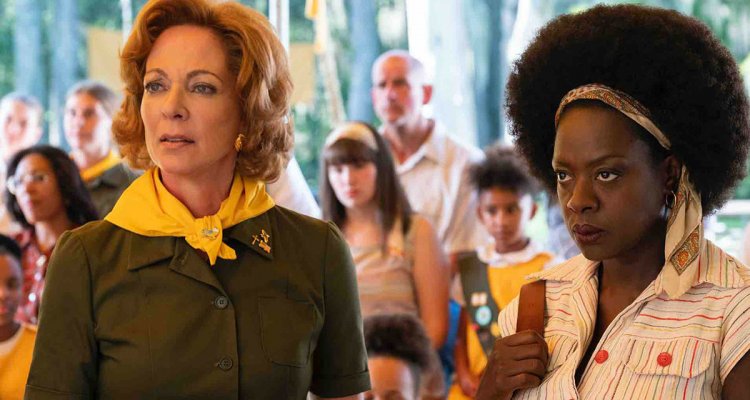Planet Earth isn’t always a fair place. Christmas Flint (Mckenna Grace) would rather watch the shooting stars in the night sky, using her flashlight to signal aliens so that they can communicate with the aluminum foil wrapped colander the young girl has turned into an antenna, than worry about any kind of pageantry. She’s read a number of books on every planet in the Milky Way and always seems to have her library book limit maxed out. Christmas would rather watch the new “Outer Limits” episode than worry about being whatever the world seems to expect from a lady.
Set in the fictional town of Wiggly, George in the year 1977, coming-of-age comedy “Troop Zero” — based on a play written by “Beasts of the Southern Wild” co-writer Lucy Alibar and directed by the duo, Bert & Bertie — delivers a heartfelt, hard-earned message of acceptance and belonging, having a grand-ole time through a standard feel-good formula. You’d have to be heartless to not find a few scenes that brighten your day and bring a smile to your face, but the story structure is incredibly by-the-books. There is also an assortment of inconsistently used ‘90s aesthetic references, which can be fun, but more often seem like undisciplined outliers; influences range from Wes Anderson, the Coen Brothers, and, surprisingly, Quentin Tarantino, but it is perhaps “The Parent Trap” remake that the film is most indebted to (okay, maybe half-kidding about the last one).
Allison Janney plays Miss Massey, the town’s schoolhouse principal, who has taken it upon herself to prepare young girls for the eventual joys of motherhood. Christmas is frequently bullied by her Birdie Scout (basically Girl Scouts) troop as a “falsely accused bedwetter” but seems to take it in stride whenever she’s the victim of a nasty haircut. After learning that the first-place winners of the upcoming Jamboree talent competition will have their song charted onto Voyager’s Golden Record, Christmas recruits a motley crew of misfits to help her win the priceless prize of having your voice shot into orbit.
A Birdie Scout group can’t enter without a “Mother” presiding over the girls though, so fellow local Rayleen (Viola Davis, sporting a snazzy hairstyle), whose mutual resentment with Massey appears to go way back, opts to help Christmas and her new friends meet the quality code they must adhere to in order to qualify for the talent show. Each member of the troupe must earn at least one merit badge, and the kids typically all afforded the honorable mention trophies set their sites on talking down the prissy, polished, and popular Birdies.
Like a recent film such as “Love, Simon,” “Troop Zero’s” very existence almost counterbalances all of its obvious hiccups (the former being largely more successful though). Proper representation in coming of age adventure films — movies that include all races, genders, and personal identity labels — have been a rarity until recent years, and while Bert & Bertie’s movie tugs at heartstrings harder than it needs to (particularly in the last act), “Troop Zero” is a genuinely moving film about learning how to do something that is never easy: not being afraid to laugh at yourself.
When a child’s world is run by contests based around judgment, competitions become unfairly personal, resulting in unwarranted cruelty between opposing parties. Davis and Janney are both excellent as the long-time nemeses, seething within their smiles across the classroom, using passive-aggressive niceties, still proverbially pulling each other’s hair, all these years later.
But several obvious obstacles are thrown into the script and the film’s blatant homages are just unnecessary. One sequence has the courage to shamelessly riff on the opening of “Reservoir Dogs,” with Viola Davis leading a slow-motion strut, with lollipops instead of cigarettes, featuring plastic star-shaped sunglasses. It’s amusing, but stylistically the flick is simply all over the place. A Wes Anderson dolly move is used once, and never again. A sweet young character with big bug glasses is allegedly missing an eye, covering it with a giant band-aid; it appears to be an homage to the grassroots atmosphere of John Goodman’s Cyclops character in “O Brother, Where Art Thou.” The nods seem meant to signify the dismantling of cinema’s former “No Girls Allowed” club, yet draw a lot of unwanted attention to themselves, sometimes valuing the wink of a witty callback over narrative progression and emotional investment.
Possibly the most refreshing aspect of the film is the inclusion of a potentially non-binary character named Joseph, who is labeled a “half-girl” by Massey’s rival group because they listen to Aretha Franklin, Freddie Mercury, and dream of being a beauty stylist. Glam rock tunes such as David Bowie’s “Starman” would feel forced if they didn’t fit the virtues of the project so perfectly.
Watching Christmas run around trying to keep her boots on, one might think of Scout from Harper Lee’s “To Kill A Mockingbird.” Her father (played by Jim Gaffigan) isn’t exactly an Atticus Finch type, but he’s often trying his best to be. There’s a town mob scene that’s a tad reminiscent of the jailhouse scene in Lee’s novel, but the movie flips the dynamic in almost an “I am Spartacus” kind of manner. For a moment, it seems like the entire community has realized what the right thing to do is. However, such heightened moments of doing the right thing, feel-good fantasy can come off as puffy, if not fully earned. “Troop Zero” deserves a merit badge, most certainly, but it’s overly concerned with homages and owes a fair share of its success to old-fashioned formula, which prevents Bert & Bertie’s film from being a complete success. [B-]

